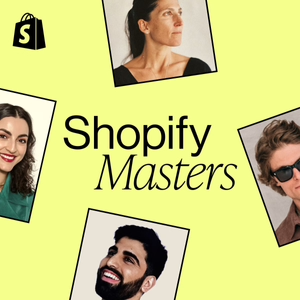
Playing to your strengths and strengthening your brand identity with Seismic's Doug Winter
Explicit content warning
04/25/22 • 33 min
Key Points:
- Doug explains how Seismic's founders saw a market opening (00:55)
- How Seismic created a category and helped define a new word (02:43)
- How the founders played to their strengths and industry experience (04:37)
- My thoughts on founders playing to their strengths, and a quote from Unqork's Gary Hoberman (06:38)
- How Seismic achieved product-market fit (08:35)
- I explain why you need to be the best at something specific if you want to win (09:28)
- "Contacts become contract" and a quote from YC's Michael Seibel (11:08)
- Why Doug believes the saying "only the paranoid survive" (13:11)
- How Seismic usurped the category leaders by acquiring them (14:36)
- My thoughts on creating categories and subcategories with a quote from Prof. David Aaker (16:05)
- Why Seismic is so focused on keeping their customers happy to avoid commoditization (19:14)
- Doug's thoughts on staying true to your brand identity (20:47)
- I explain the importance of prioritizing brand identity (21:50)
- Seismic's acquisition strategy (25:00)
- My thoughts on strategic acquisitions with a quote from LegalZoom's John Suh (26:27)
- Wrap up (31:35)
Mentioned:
Establishing authority via industry experience with Unqork’s Gary Hoberman
My Links:
Key Points:
- Doug explains how Seismic's founders saw a market opening (00:55)
- How Seismic created a category and helped define a new word (02:43)
- How the founders played to their strengths and industry experience (04:37)
- My thoughts on founders playing to their strengths, and a quote from Unqork's Gary Hoberman (06:38)
- How Seismic achieved product-market fit (08:35)
- I explain why you need to be the best at something specific if you want to win (09:28)
- "Contacts become contract" and a quote from YC's Michael Seibel (11:08)
- Why Doug believes the saying "only the paranoid survive" (13:11)
- How Seismic usurped the category leaders by acquiring them (14:36)
- My thoughts on creating categories and subcategories with a quote from Prof. David Aaker (16:05)
- Why Seismic is so focused on keeping their customers happy to avoid commoditization (19:14)
- Doug's thoughts on staying true to your brand identity (20:47)
- I explain the importance of prioritizing brand identity (21:50)
- Seismic's acquisition strategy (25:00)
- My thoughts on strategic acquisitions with a quote from LegalZoom's John Suh (26:27)
- Wrap up (31:35)
Mentioned:
Establishing authority via industry experience with Unqork’s Gary Hoberman
My Links:
Previous Episode

Expanding internationally into market openings with Kameleoon's Jean-René Boidron
Key Points:
- Jean-René explains how Kameleoon got its start (01:07)
- How Kameleoon got an advantage by establishing itself outside of the dominant North American market (02:40)
- My thoughts on finding market openings and targeting a specific set of customers (05:34)
- Why Kameleoon keeps its core strategy the same globally, which some localized differences (07:00)
- I explain the advantages of being more local with a quote from Prof. Richard Lynch (09:06)
- Jean-René explains the market verticals Kameleoon is focused on (13:22)
- Why word of mouth is a pillar of Kameleoon's marketing strategy (15:27)
- I explain why building mental availability is essential to generating more word of mouth (16:42)
- Why Kameleoon prefers to go "slow in the right direction" over "fast in the wrong one" (18:04)
- My thoughts on why product differentiation is important, but not enough to win you the game, with a quote from Gong's Chris Orlob (19:16)
- Jean-René explains why smaller markets don't see as much commoditization as large ones (21:43)
- Why Kameleoon was hesitant to rely on lots of VC funding in the early days (24:46)
- My thoughts on the challenges of over-funding startups with a quote from Jason Calacanis (26:23)
- Wrap up (28:57)
Mentioned:
My Links:
Next Episode

Aligning your business to your customers' interests with HoneyBook's Oz Alon
Key Points:
- How HoneyBook got its start (00:58)
- Oz explains why he views competitors as incentive for improvement (02:27)
- Why HoneyBook is shifting strategies to invest in category creation (04:31)
- My thoughts on category and subcategory creation with a quote from Guillaume Cabane (06:08)
- I explain why choosing an ideal customer and being the best at catering to their specific needs is a winning strategy (11:51)
- Oz relates what he learned from HoneyBook's failed experiments (12:45)
- I discuss the experimenter's mindset, with a quote from author Annie Duke (14:04)
- Oz maps out the four main sales channels that are productive for HoneyBook (15:59)
- I explain why word of mouth is the most important channel for B2B marketers with a quote from Metadata's Jason Widup (19:53)
- Oz explains HoneyBook's obsession with their customers, and why he feels that gives them a competitive advantage (22:00)
- My thoughts on the value of doing things that don't scale in the early days of your business, with a quote from Airbnb's Joe Gebbia (25:11)
- Oz advises founders to focus on aligning their business models with their customers' interests (29:11)
- Wrap up (30:40)
Mentioned:
How Guillaume 'G' Cabane identifies growth opportunities for businesses
"Thinking in Bets" by Annie Duke
My Links:
If you like this episode you’ll love
Episode Comments
Featured in these lists
Generate a badge
Get a badge for your website that links back to this episode
<a href="https://goodpods.com/podcasts/how-to-win-podcast-with-peep-laja-185919/playing-to-your-strengths-and-strengthening-your-brand-identity-with-s-20604909"> <img src="https://storage.googleapis.com/goodpods-images-bucket/badges/generic-badge-1.svg" alt="listen to playing to your strengths and strengthening your brand identity with seismic's doug winter on goodpods" style="width: 225px" /> </a>
Copy





